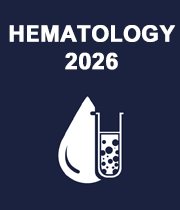Modern Hematology
Hematology, or the research and treatment of blood problems, is a specialisation of internal medicine. Hematology is the branch of medicine that studies the causes, prognosis, treatment, and prevention of blood-related disorders. It entails treating disorders that impact blood production and its constituents, such as blood cells, haemoglobin, blood proteins, bone marrow, platelets, blood arteries, spleen, and the coagulation process. Hematologic malignancies account for around 10% of all cancers in the United States, and the treatment of individuals with hematologic malignancies has altered considerably in the previous 20 years. Death rates have decreased across all cancer kinds, and conditions that were formerly lethal, such as chronic myeloid leukaemia, have become treatable because to new medicines.



Title : Acute intermittent porphyria: A neurological dilemma obscured by ubiquitous fgastrointestinal presentation
Mayank Anand Singh, Mimer Medical College, India
Title : Comprehensive symptom management and supportive nursing care in a preterm toddler undergoing HSCT for pyruvate kinase deficiency
Tran Thi Dung, Vinmec International Hospital, Vietnam